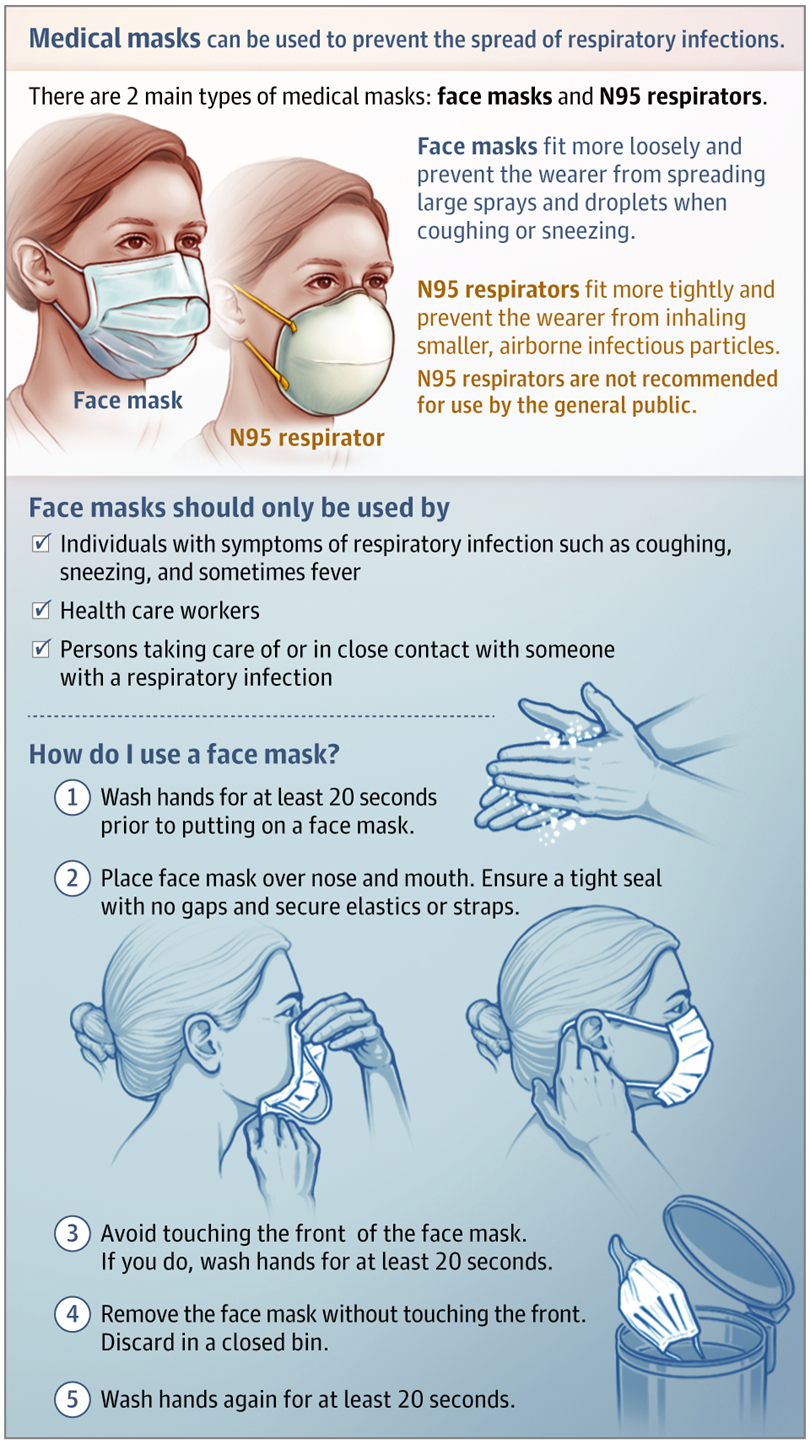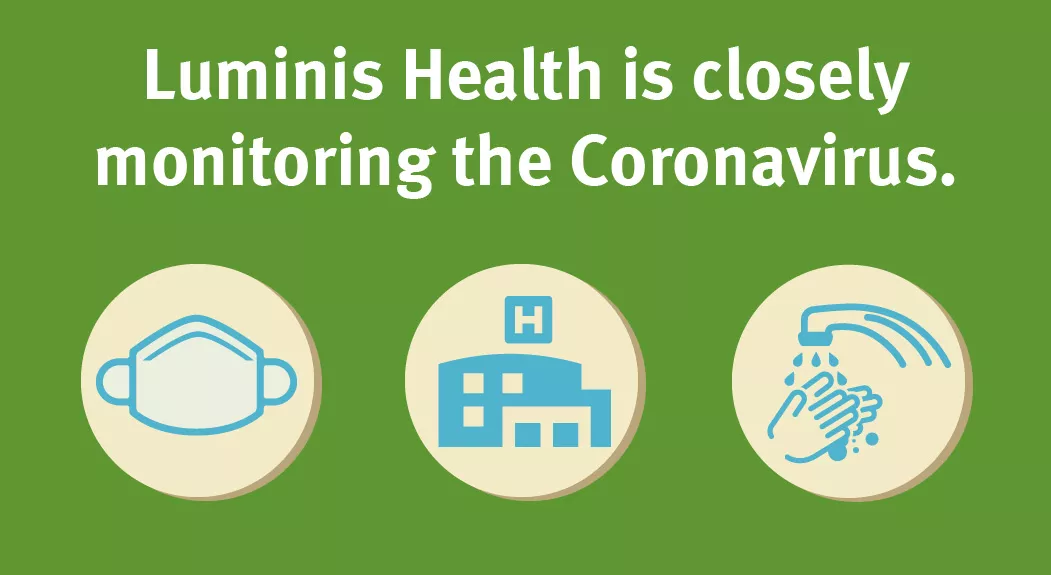Last updated at 12:45 pm Friday, May 15, 2020.
In order to provide our patients and community members with helpful information about the 2019 Novel Coronavirus (COVID-19), we’ve created this post to share general information as well as details specific to those seeking care at a Luminis Health facility.
For the safety of our patients, visitors and staff, the following visitor restrictions are in effect:
To best protect our patients and team members, no visitors, with few exceptions, will be allowed until further notice. This is a proactive measure to reduce the spread of COVID-19. In the few cases where visitation is allowed, it is limited to one visitor per day.
Exceptions include:
- Critical or end-of-life care situations
- Laboring mother support person
- Caregiver of a patient 21 years of age or under
- Surgical patient support person
- Outpatient test/procedure companion
- Person serving as surrogate decision maker
- Person performing official governmental function
- Person serving as support person for patients with disabilities
To support this safety measure, all visitors will be screened upon arrival, and must pass a health screening to enter the facility.
- No visitors under the age of 18 unless they are parents of hospitalized children. This policy includes infants and siblings. AAMC NICU visitors are restricted to parents only, one at a time.
- People experiencing cold or flu-like symptoms should not visit.
- Patients coming to any Luminis Health facility with respiratory symptoms must request a mask upon arrival.
- Visitors returning from international travel may not visit until they have been in the United States, symptom free, for 14 days.
- We are suspending non-essential large (10 or more people) gatherings scheduled to take place on our campuses. If you have questions about an event you are scheduled to attend, please check with your event coordinator.
Because the situation is rapidly evolving, we often reference Centers for Disease Control and Prevention (CDC) or Maryland State Department of Health websites below for the latest information. We encourage you to visit those sites for breaking information.
If I am feeling sick, should I still keep my appointment?
As you know, the world is experiencing notable person-to-person transmission of the novel coronavirus (COVID-19). Experts estimate that the majority of people who get this virus may have mild symptoms. But it can be quite severe for members of our community with underlying health conditions.
For this reason, we ask that if you have any respiratory symptoms – such as a cough, runny nose, nasal congestion, sneezing, or fever – that you please cancel or postpone your specialist appointment unless it is absolutely essential. We know that you may have waited or planned for this visit, so we will make it a priority to reschedule your appointment when you are feeling better.
Staying home while sick is one of the most important things you can do to help during this time. All of us have to work together to reduce the chance of transmission of this (or other) respiratory viruses.
If you have respiratory symptoms, please call your primary care provider’s office to be evaluated. If you have traveled recently to China, Italy, Japan, Iran or South Korea, or think you may have been exposed to someone who tested positive for the novel coronavirus, please call your county health department.
We appreciate your patience and consideration. Thank you for helping us keep your family, friends and neighbors healthy.
What is 2019 Novel Coronavirus/COVID-19 and what are the symptoms?
COVID-19 is a respiratory illness that can spread from person-to-person. The virus that causes COVID-19 is a novel coronavirus that was first identified during an investigation into an outbreak in Wuhan, China, in late 2019 and has now been detected in more than 170 countries.
COVID-19 has similar symptoms to the flu, which include coughing, fever, sore throat and difficulty breathing.
This is an emerging and evolving situation. For the most updated guidance, symptoms and information, visit the CDC website.
How is COVID-19 spread?
COVID-19 spreads between people who are in close contact with each other (within six feet) through respiratory droplets from coughs or sneezes. According to the CDC, there have not been documented cases of transmission of COVID-19 from surfaces contaminated with the virus. However, the CDC recommends cleaning visibly dirty surfaces followed by disinfection to help prevent COVID-19 and other viruses in homes and community settings.
Are symptoms of COVID-19 different in children than in adults?
The symptoms of COVID-19 are similar in children and adults, though children who have tested positive have generally exhibited milder symptoms. The CDC says it’s unknown whether children with underlying medical conditions and special health care needs might be at higher risk, however.
What are the policies for visiting family and friends in the hospital who are being treated for COVID-19?
To further minimize community spread of COVID-19, we are not permitting visitors for patients who have tested positive for COVID-19. For those patients, we can set up other means of communication for loved ones – FaceTime, phone calls, etc.
I am scheduled for a surgery or procedure at a Luminis Health hospital – should I reschedule my appointment?
As of March 18, 2020, we started limiting surgeries and procedures to emergencies or urgent cases only. This measure is now in effect until further notice. We are contacting patients directly.
I have an appointment scheduled with my primary care provider or specialist – should I reschedule my appointment?
In line with other measures taken to protect our staff and patients, and limit the transmission of COVID-19, starting March 24, 2020 until further notice, we will limit all outpatient in-office appointments to urgent patients requiring a physical exam only. We’ll shift all other routine visits to telemedicine visits or we’ll reschedule. Offices will remain open to staff, but not the public. This way we can continue to receive calls, triage the needs of patients and providers, and answer all requests and messages from patient portals. Our staff is already hard at work putting these measures in place.
Is my Energize fitness class still scheduled?
For the health and safety of all of our fitness fanatics, we are cancelling our Energize fitness classes for now. We encourage safe, outdoor exercise as the weather gets warmer. For our moms-to-be, check out our guide to safe exercise during pregnancy.
I am currently in the cardiac rehabilitation program – should I still go in?
For the health and safety of our patients, staff, and community, AAMC’s Outpatient Cardiac and Pulmonary Rehabilitation program will be cancelled for the time being. For updates, please call 443-481-1929.
What if I think I have symptoms of COVID-19 and want testing?
If you have symptoms of COVID-19 – with or without recent travel to China, South Korea, Japan, Italy or Iran – please call your health care provider to see if further screening is necessary before you arrive at one of our locations. By calling in advance, your provider can take your health history over the phone and, if needed, work with the appropriate state officials to determine if you require testing. In most cases, outpatient management with self-isolation at home is the best way to manage COVID-19 symptoms.
When should I go to the Emergency Department?
Only patients with fever, cough or shortness of breath and symptoms such as rapid heart rate, low blood pressure, high or very low temperatures, confusion, trouble breathing or severe dehydration should seek medical care in the ED. Call ahead to tell the ED that you are coming so we can be prepared for your arrival.
If I am a high-risk individual, how should I protect myself?
In order to reduce your risk of exposure to COVID-19, we recommend taking several precautions. You can learn more here.
How does COVID-19 impact your pregnancy and baby?
As with many other things, your immune system changes during pregnancy. This is normal, but it can increase your risk for contracting viruses and developing complications. Unfortunately, little is known about COVID-19’s effect on pregnant women and infants. Based on experiences from other coronaviruses, pregnant women may be at higher risk of severe respiratory illness, morbidity, or death as compared with the general population.
It is important to understand that, so far, COVID-19 has not been detected in either amniotic fluid or breast milk. However, it is too early to determine long-term effects on infants born to women who had COVID-19 during their pregnancy.
Is it safe for me to deliver my baby at Anne Arundel Medical Center?
Yes, our visitor restrictions are in place for the safety of patients, visitors and staff, including parents-to-be. We continue to follow the recommendations of the CDC and the Department of Health. Check out these frequently asked questions about giving birth during this pandemic, and our answers.
Can COVID-19 be passed from a pregnant woman to the fetus or newborn?
It is unknown if a pregnant woman with COVID-19 can pass the virus to her baby through pregnancy and delivery. According to the CDC, no infants born to mothers with COVID-19 have tested positive for the virus.
How is Luminis Health prepared for COVID-19 in our community?
We are prepared and ready to care for patients with suspected or confirmed cases of COVID-19. Our clinical teams have been trained on how to identify, isolate and care for patients with this and other contagious illnesses. We have protocols and systems in place to keep patients, visitors and health care workers safe, and we work closely with the CDC and local and state departments of health to implement their guidance into our established protocols.
Are there any people with COVID-19 in our community?
Yes, there are confirmed COVID-19 cases in Maryland. Please check with the Maryland State Department of Health and your local department of health for the latest information and alerts.
How do I keep myself and my family safe?
The CDC released a step-by-step guide about how households should handle a potential outbreak of coronavirus in their community.
The CDC also recommends the below everyday preventive actions to help prevent the spread of respiratory diseases, including:
- Wash your hands often with soap and water or use an alcohol-based hand sanitizer with at least 60% alcohol.
- Avoid close contact with people who are sick.
- Avoid touching your eyes, nose and mouth.
- Stay home when you are sick.
- Cover your cough or sneeze with a tissue, then throw the tissue in the trash.
- Clean and disinfect frequently touched objects and surfaces using a regular household cleaning spray or wipe.
Learn more about how and when to use medical masks from the Journal of the American Medical Association:






